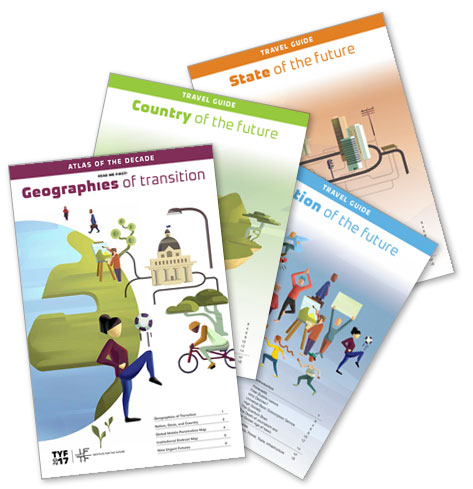2017 Ten-Year Forecast

2017 Annual Ten-Year Forecast Summit: Geographies of Transition
We are entering a period where it is, clearly, no longer appropriate to rest on our assumptions about both how the world works and how we do business. It is as if the planet has literally tilted off of its axis.
What we need now is clarity, not confidence. We must re-calibrate our perspectives to this high volatility environment, and to the new principles, structures, and models that will prove successful as the landscape twists and evolves around us. Regardless of what it is our organizations do, we need to be willing to ask ourselves not just how confident we are of any given scenario or outcome, but how we know what we know. The 2017–2027 Ten-Year Forecast was created to aid in this effort.
At the center of this re-calibration explored in IFTF's Atlas of the Decade (PDF) are nine urgent futures—major drivers of volatility that will significantly impact every market and sector over the next decade, pushing us into noisier and more uncertain futures. These introductory perspectives will help you align your organizational and strategic priorities with external forces of change, covering issues that we often fail to address within our organizations, networks, and communities.
The three travel guides that accompany this Atlas of the Decade (PDF) were designed to help you dive deeper into the geographies of transition that will transform the way we work, learn, live, and play between now and 2027. They explore what algorithmic innovation zones in Shenzhen tell us about which business models are likely to become deeply uncompetitive, and which ones will ascend. They probe connections between infrastructure entrepreneurs in Haiti and potential new work streams for rural Appalachia. And they discuss diverse topics at the edges of our current thinking, from Quantum Cognition to Special Oceanic Zones to Universal Basic Subscription Services. These 18 forecasts and 12 scenarios for 2027 provide landmarks of what’s possible—guideposts with which to populate our future plans.
- State of the Future Travel Guide (PDF)
In the coming decade, we’ll discover that our governmental institutions and infrastructure, though slower moving than the media and retail industries, are not immune to the disruptive forces that have rippled through our companies and organizations over the past 20 years. - Nation of the Future Travel Guide (PDF)
As we look toward 2027, we find hyper-connected populations—with a strong distrust in existing institutions—who are actively coordinating their lives, forging new revenue streams, and developing their own political goals in ways that have significantly decreasing dependencies on their local geography and centralized governments. These are the stories of our post-global nations. - Country of the Future Travel Guide (PDF)
As people migrate like never before, and innovative new businesses stretch effortlessly across the globe, our relationship to our physical geographies is changing fundamentally.
Before navigating the choppy waters of the coming decade, we must first assess the essential foundation of our maps. Do our traditional geographical assumptions really set us up for the paths we’re likely to take?




